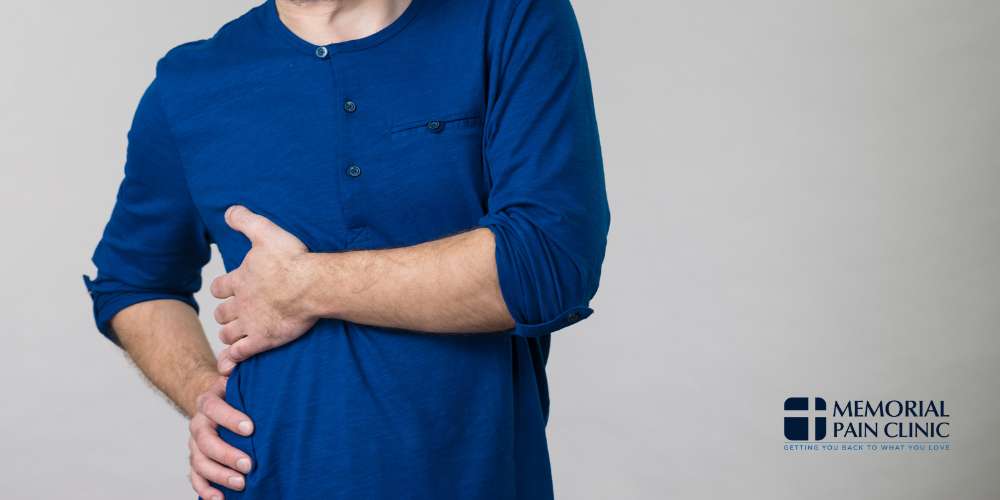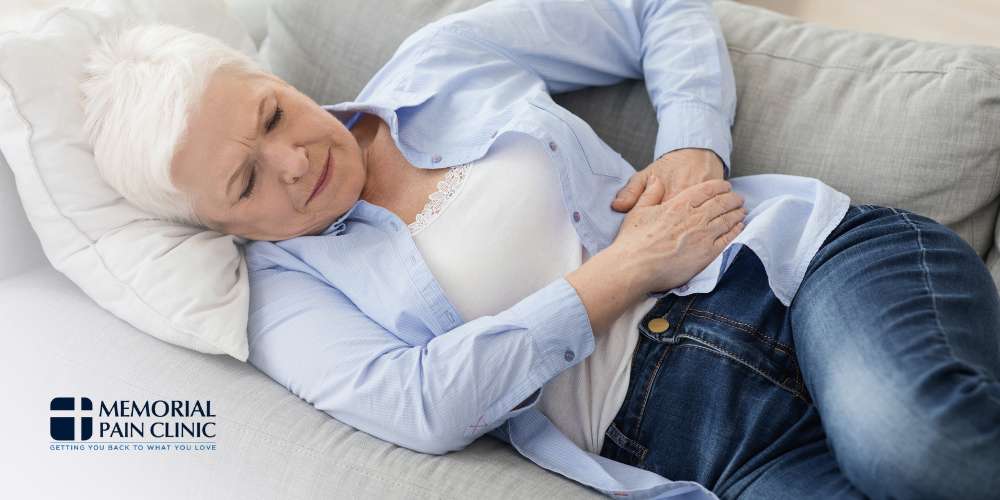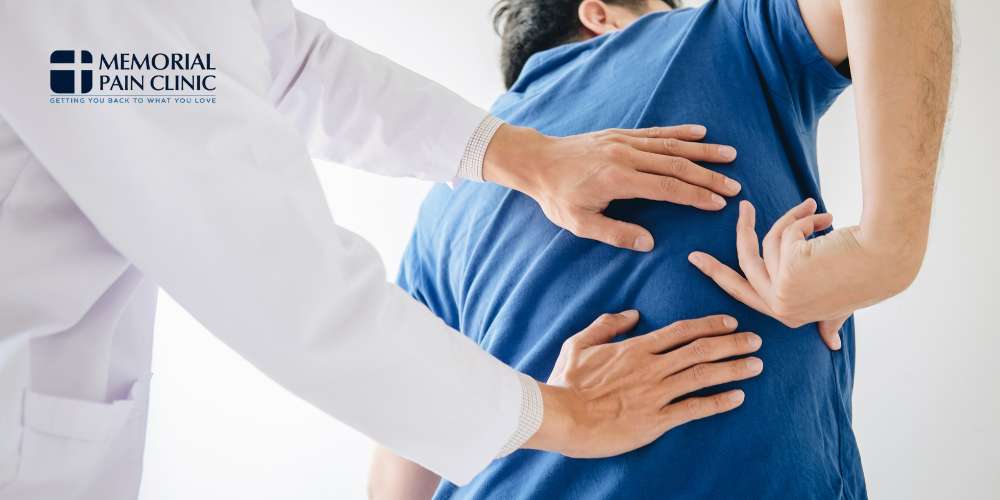Pain around the ribs and back can be a source of discomfort that disrupts daily life, limits movement, and causes concern for many. This back and rib pain may range from a dull, aching sensation to sharp, intense pain that flares up with deep breaths or specific movements.
Causes of rib and back pain vary, from muscle strains and rib injuries to underlying health conditions involving the lungs, spine, or internal organs. Understanding the cause behind pain around ribs and back symptoms is essential for finding effective relief and improving your quality of life.
If you’re experiencing persistent rib or back pain in Tulsa, the medical professionals at Memorial Pain Clinic are here to help. Call (918) 200-9944 or complete our online contact form to learn more about your options for managing pain and finding lasting relief.
Why Do My Ribs Hurt?

Rib pain can result from minor muscle strains to more serious medical conditions. The rib cage is a crucial part of the body’s structure, protecting vital organs like the lungs and heart, but it is also susceptible to injury, strain, and chronic conditions.
Pain in this area might feel sharp or dull and can worsen with movements like taking deep breaths or stretching. In some cases, rib pain may be related to the thoracic spine or surrounding connective tissue, and the cause may not always be immediately clear. Addressing rib and back pain involves identifying the root cause, which helps guide effective pain management in Tulsa.
Rib Injuries
Rib injuries, like rib fractures or bruising, are a common source of rib cage pain. These injuries often result from trauma, like falls or impacts during sports, which can lead to sharp pain in the rib area, especially with movement or breathing deeply.
Rib injuries can cause intense pain and muscle spasms as the body tries to protect the injured area. Proper care, which may include rest and managing pain with over-the-counter medications, is essential to promote healing and relieve symptoms.
Intercostal Muscle Strain
An intercostal muscle strain occurs when the muscles between the ribs, known as intercostal muscles, are overstretched or torn, causing rib pain and discomfort in the chest wall. This type of muscle strain can be caused by sudden twisting motions, heavy lifting, or even excessive coughing. Intercostal muscle strain is often accompanied by muscle spasms and sharp pain that intensifies when taking deep breaths or moving the upper body.
Osteoporosis
Osteoporosis weakens the bones, including the ribs, making them more prone to fractures. This condition can lead to chronic pain around the rib cage and upper back. People with osteoporosis may experience rib pain from minor hits or even regular movements, as the bones are more susceptible to fractures. Managing osteoporosis is essential to prevent injuries that can cause rib and back pain.
Fibromyalgia
Fibromyalgia is a chronic condition that causes widespread muscle pain and tenderness, which may extend to the rib cage and back. People with fibromyalgia often experience symptoms like persistent pain, muscle tightness, and fatigue and may notice a dull, aching pain in the ribs or back. This condition can make daily activities difficult and lead to ongoing discomfort in the rib and upper back area.
Costochondritis
Costochondritis is an inflammation of the cartilage connecting the ribs to the sternum, or chest bone, causing pain around the rib cage. This pain often resembles that of a heart attack, leading to chest pain and discomfort that worsens with movement or deep breaths. Although costochondritis may cause severe chest pain, it is typically non-life-threatening and can be managed with appropriate treatment.
Slipping Rib Syndrome
Slipping rib syndrome occurs when the lower ribs move excessively, irritating surrounding nerves and tissues. This movement can cause sharp pain in the chest and upper back, often felt more on one side. Slipping rib syndrome may result in rib discomfort that worsens with certain activities, and the pain can sometimes radiate toward the shoulder blades or back.
Infections
Infections, especially respiratory infections like pneumonia, can lead to rib and back pain. When the lungs are affected by an infection, it can cause symptoms like sharp pain, fever, and difficulty breathing. Lung infections may lead to chest wall pain as the body fights off the infection, and addressing the infection is necessary to ease rib discomfort and back pain.
Nerve Pain
Nerve pain, or neuropathy, can also cause discomfort in the ribs and back. Conditions like shingles, which affect the nerves around the rib cage, can lead to intense pain, burning, or tingling sensations. Nerve rib pain can be persistent and difficult to manage, as it involves irritation or inflammation of the nervous system.
Organ Dysfunction
Issues with internal organs can also manifest as rib pain. For example, gallbladder or liver problems may cause referred pain, which feels like discomfort in the ribs or back. These types of pain around ribs and back symptoms often appear as dull, aching sensations and may worsen with certain movements or after eating, depending on the underlying cause.
Unhealthy Lifestyle Habits
Unhealthy habits, such as poor posture or lack of exercise, can also contribute to rib and back pain. Poor posture can strain the muscles supporting the rib cage and spine, leading to chronic pain. Additionally, lifestyle factors like smoking can impact blood flow and muscle health, increasing the risk of rib discomfort and back symptoms.
Degenerative Disc Disease in the Thoracic Spine
Degenerative disc disease in the thoracic spine can cause upper back pain that radiates toward the ribs. This condition, which results from the gradual wearing down of spinal discs, can lead to sharp pain and stiffness in the ribs and back. Over time, degenerative disc disease may worsen without proper treatment, making it important to seek pain management options.
Cancer
Certain cancers, such as lung cancer, can cause rib pain when they affect the chest area or spread to the bones. Lung cancer can lead to persistent rib and back pain as tumors press on nerves or surrounding structures, resulting in symptoms that often include sharp, unrelenting pain that may worsen over time.
At Memorial Pain Clinic, cancer pain management in Tulsa is essential in these cases, as it provides relief while supporting overall quality of life. Early detection and effective pain management are key in addressing these symptoms and improving comfort.
Pulmonary Embolism
A pulmonary embolism, a blood clot in the lungs, is a serious condition that may cause sudden, severe chest pain and difficulty breathing. This pain can radiate toward the back and is usually accompanied by other symptoms like shortness of breath and rapid heart rate. Pulmonary embolism requires immediate medical attention to prevent further complications.
Sprained Ligaments
Sprained ligaments around the ribs or upper back can lead to rib and back pain. Ligament strains often occur from overuse or sudden twisting motions, resulting in discomfort that worsens with movement. These sprains often cause sharp pain near the rib cage and can be managed with cold packs and rest to reduce inflammation.
Common Causes of Back and Rib Pain

Back and rib pain can be caused by injuries, muscle strain, and conditions affecting the organs near the rib cage and upper back. Pain in this area can be sharp, dull, or radiate from one side to the other, making it challenging to pinpoint the exact origin without a thorough evaluation.
Understanding the common causes of rib and back pain can help you determine when it might be necessary to seek professional pain management.
Pain Around Ribs and Back Symptoms Left Side
Rib and back pain on the left side could result from issues with internal organs, muscle strain, or joint irritation in the upper back region. This pain around ribs and back symptoms include sharp pain when taking deep breaths or dull aching pain that lingers. Because different conditions can cause left-sided rib and back pain, determining the underlying cause is essential for effective treatment.
Pancreatitis
Pancreatitis, or inflammation of the pancreas, can lead to pain around the ribs and back, particularly on the left side. This medical condition often causes severe pain that may radiate toward the back, especially after eating. Pancreatitis-related pain can be intense and may worsen over time if left untreated. Symptoms often include nausea, abdominal discomfort, and back rib pain.
Musculoskeletal Issues
Muscle strains and ligament sprains on the left side of the upper back can also contribute to rib and back pain. Sudden movements, heavy lifting, or poor posture can lead to musculoskeletal issues that cause sharp or persistent pain near the ribs. Muscle spasms or tightness in the intercostal muscles can make deep breaths painful.
Pain Around Ribs and Back Symptoms Right Side
Pain around ribs and back symptoms on the right side can be linked to several potential causes, including gallbladder issues, gastrointestinal conditions, or strained muscles. Right-side rib pain may feel like a dull, aching pain or sharp, stabbing discomfort that worsens with movement.
Gallbladder Issues
Gallbladder problems, such as gallstones, can lead to rib pain on the right side that may radiate to the back. This type of back rib pain often occurs after eating a fatty meal and may be accompanied by nausea or bloating.
Gastrointestinal Issues
Digestive problems, like acid reflux or indigestion, may cause discomfort on the right side that feels like rib cage pain. When stomach acid irritates the esophagus, it can create a burning sensation that radiates toward the back. While gastrointestinal issues may not directly impact the rib cage, the discomfort they cause can feel like rib and back pain.
Pain on Right Side Under Ribs Towards Back at Night
Pain at night on the right side under the ribs and radiates toward the back could indicate issues with the kidneys or musculoskeletal system. This type of pain often becomes more noticeable at night when lying down, making it difficult to get restful sleep.
Kidney Problems
Kidney problems, including infections or kidney stones, can lead to significant pain on the right side under the ribs and toward the back. Kidney-related pain is often sharp and intense, occurring more frequently at night or when lying on the affected side. Other symptoms, such as fever or changes in urination, may accompany kidney-related back pain and should be evaluated by a medical professional.
Musculoskeletal Problems
Muscle strain or tension in the upper back or rib cage area can also lead to pain on the right side that worsens at night. Poor posture, overuse, or lifting heavy objects can strain the muscles, causing persistent discomfort that may worsen when lying down. Simple steps like adjusting your sleeping position or using a cold pack may provide temporary relief.
When to Be Concerned About Back Pain, Rib Pain, or Chest Pain

It’s natural to be concerned about back pain, rib pain, or chest pain, especially if it begins suddenly or feels intense. While many types of pain in these areas result from minor issues like muscle strain or poor posture, certain signs indicate the need for immediate medical attention.
If you experience sharp, severe pain that radiates to your shoulder blades, have difficulty breathing, or notice pain accompanied by fever or numbness, it could signal a more serious underlying condition, such as a pulmonary embolism, heart issue, or infection.
Persistent or worsening pain that doesn’t improve with rest or over-the-counter medications may also warrant a visit to a healthcare provider. At Memorial Pain Clinic in Tulsa, our team is here to help identify the root cause of your pain and provide effective, compassionate care.
Treatments for Pain Around Ribs and Back Symptoms

Treating pain around the ribs and back depends on the underlying cause and the intensity of the symptoms. For many, a combination of rest, cold packs, and over-the-counter medications can help reduce mild to moderate pain from muscle strains or minor rib injuries.
In cases of persistent or severe back and rib pain, Memorial Pain Clinic offers nonsurgical options to relieve discomfort and improve daily function. These may include targeted pain management techniques, such as steroid injections to reduce inflammation and relieve pain or nerve blocks to address nerve-related rib and back pain.
If the pain around ribs and back is caused by structural issues along the spinal cord or more complex musculoskeletal conditions, Memorial Pain Clinic can provide referrals for physical therapy or even surgical consultations if needed. Physical therapy may be beneficial for rebuilding strength and flexibility in the upper back, while surgical options may be considered for severe cases that don’t respond to conservative treatments.
Contact Memorial Pain Clinic for Pain Around Ribs and Back Symptoms Treatment in Tulsa

If you’re struggling with persistent pain around your ribs and back, don’t let it continue to affect your quality of life. At Memorial Pain Clinic, we’re dedicated to helping you find relief through tailored, effective pain management solutions. Our team will work with you to identify the underlying cause of your pain and provide the treatment you need to get back to comfortable, active living.
Call (918) 200-9944 or complete our online contact form to schedule a consultation and take the first step toward lasting relief.

